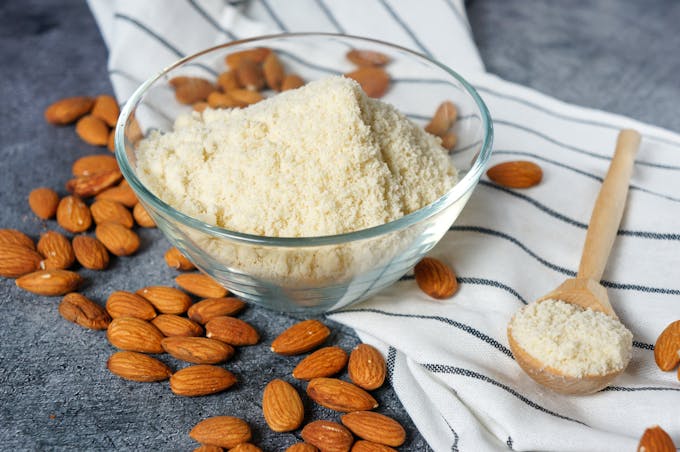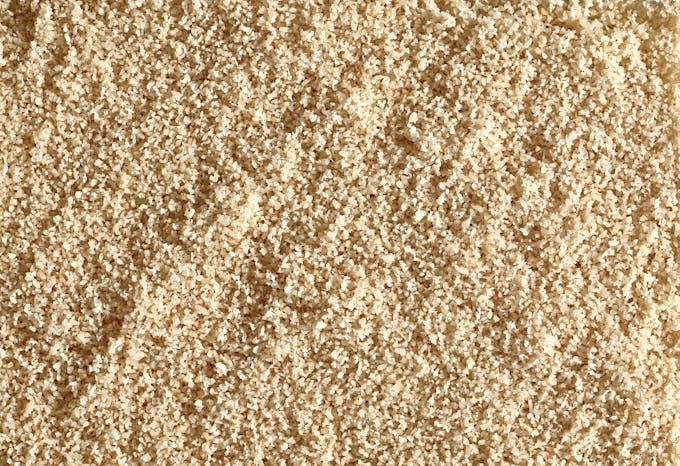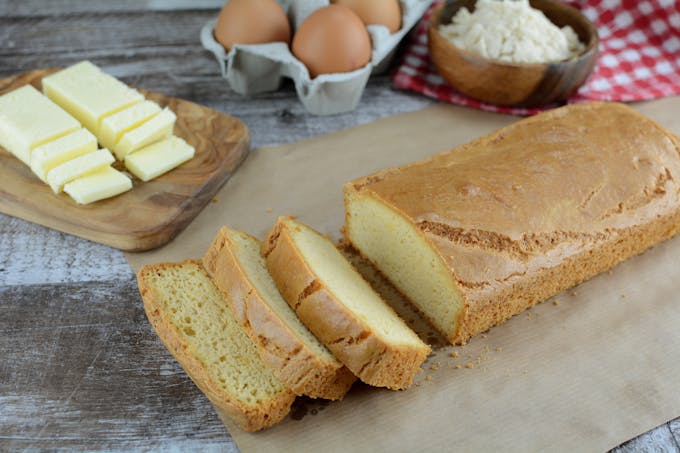Why Almond Flour Is the Best Flour for Baking
Almond flour is the perfect flour for gluten-free, low-carb baking. You can make almost anything with almond flour—from almond flour pancakes to almond flour fried chicken!
Let’s take a look at the many benefits of baking with almond flour, along with some delicious recipes!

What is almond flour?
Almond flour is made of blanched, finely ground almonds. It’s naturally gluten-free and is a rich source of protein, vitamin E, and many trace minerals.
Almonds are some of the best nuts for a keto diet and have a higher fat-to-carb ratio than most other nuts.
Almond flour has a fluffy texture similar to all-purpose flour—so it works as an excellent substitute, especially for baking! It can be used for cookies, cakes, breads, and tasty treats like macarons.
Almond flour can also be used in savory dishes the same way you would use standard flour. You can use it as breading for meats and vegetables or to make savory pancakes and waffles.
Almond flour is an excellent option for people who want to avoid spiking their blood sugar. It’s high in fat and low in carbohydrates.
Check out this study that examines the benefits of nut consumption for insulin sensitivity and cardiovascular health.

Almond meal vs. almond flour
Almond meal and almond flour are both keto-friendly cooking options made from almonds. They are both gluten-free and have a delicious nutty flavor, but there are some key differences.
Baking with almond meal
Almond meal is made of raw, ground almonds and has a thicker, coarser texture compared to almond flour. Because the almonds are not blanched, their skin stays intact.
Almond meal is better suited when you want to add texture to a dish and is the perfect low-carb option for breadcrumbs.
Almond meal is perfect if you want to add a nice crust to a dish with a touch of almond flavor. You can use it to encrust meat, like chicken and pork tenderloin, or to top roasted veggies for some added crunch!
Baking with almond flour
Almond flour has a finer texture than almond meal and is made of finely ground blanched almonds. The blanching process removes the skin of the almonds, resulting in a finer, fluffier product.
Baking with almond flour is more similar to baking with conventional all-purpose flour. You can make delicious baked goods like almond flour cake, almond flour muffins, and even almond flour banana bread.
Almond flour can be used in just about any recipe that normally calls for wheat flour!
Is almond flour keto-friendly?
Compared to all-purpose flour, almond flour has a very low glycemic index of less than one. All-purpose flour has a glycemic index of 71!
Almond flour is much higher in protein, fat, and fiber, and much lower in carbohydrates. It contains 56 grams of fat and is a great source of potassium, magnesium, calcium, and vitamin E.
It’s also loaded with 687 milligrams of potassium, 279 milligrams of magnesium, and 216 milligrams of calcium. With just 10 net carbs and 5 grams of sugar per cup, almond flour is an excellent choice for someone on the keto diet.
Almond flour contains oxalates, which could be an issue if you’re prone to kidney stones. Though you don’t need to cut out almond flour altogether, you may want to limit your intake if you suffer from kidney stones.
This interesting study looked at the complete nutrition profile of almonds, including anti-nutrient oxalates. It was determined that the oxalate content is not significant enough to cause problems in small amounts.

Why you should bake with almond flour
Baking with almond flour allows you to enjoy baked goods like brownies, cookies, and muffins while still following a keto diet. There are so many delicious recipes that use almond flour and are 100% keto-friendly.
If you’re looking for a homemade or cheaper alternative, you can make your own almond flour! You can do this by processing blanched almonds in the food processor until they’re very finely ground.
You can also use the food processor to make almond meal, but use raw almonds instead of blanched almonds. The almonds will retain more texture because they are raw and unpeeled. You also don’t need to process them as finely.

Almond flour baking ideas
Almond flour is a key ingredient for keto-friendly, gluten-free baking. Let’s take a look at some amazing almond flour recipes for you to try.
All of these delicious recipes are low-carb and free of refined sugar, coconut sugar, and maple syrup. This makes them perfect for satisfying your sweet tooth while still keeping you in ketosis!
Almond flour bread
Baking with almond flour instead of wheat flour can actually be quite satisfying and delicious. Here are a few keto-approved gluten-free recipes to try:
Keto Yeast Bread - This bread is perfect for sandwiches and morning toast.
Keto Black Olive Focaccia - The perfect focaccia for dinner, especially if you’re entertaining.
Keto Savory Cheddar Waffles - You can make delicious almond flour waffles that are sweet or savory like this recipe.
Keto Sourdough Loaf - This recipe uses a combination of almond and coconut flour for a perfect keto-friendly sourdough loaf.
Keto Smokey Drop Biscuits - These are the perfect almond flour biscuits for dinner or a barbeque!
Savory recipes with almond flour
You can use almond flour for savory dishes too. These almond flour recipes are as unique as they are delicious. Give them a try!
Cauliflower Potato-Free Pancakes - Check out these tasty, savory almond flour pancakes that can be eaten for breakfast, lunch, or dinner.
Keto Popcorn Chicken - Almond flour can also be used to make tasty, crispy chicken.
Keto Zucchini Fries - Try these crispy, gluten-free, keto-friendly zucchini fries. You won’t miss french fries one bit!
Almond flour dessert recipes
Many people worry that they won’t be able to enjoy baked goods when they start a ketogenic diet. Baking with almond flour can be a satisfying alternative!
Many almond flour recipes call for similar ingredients like eggs, baking powder, and chocolate chips, but instead of wheat flour, ketogenic recipes use coconut flour and almond flour.
Keto Earth-Shaking Cake - This delicious almond flour cake is made with pecans, coconut, and chocolate.
Keto Lemon Ricotta Cookie Cakes - These almond flour cookies contain butter, lemon, ricotta cheese, vanilla coconut collagen powder, and monk fruit powder for sweetener.
Keto Chocolate-Topped Cookie Dough - These almond flour cookies don’t require any baking! You can also swap the butter for coconut oil to make the recipe dairy-free!
Keto Raspberry Toffee Loaf - Try one of the best almond flour baked goods that is also keto-friendly. This recipe uses a brown sugar-style monk fruit sweetener and fresh raspberries for a delicious, mild sweetness.
Keto Oatmeal Chocolate Chip Cookies - If you’re craving chocolate chip cookies, try this keto-friendly oatmeal version! These chocolate chip cookies are made with coconut flour, almond flour, and toasted coconut for an oatmeal texture.
Keto Speckled Gingerbread Fat Bombs - This delicious almond flour recipe combines cream cheese with almond flour and spices to create a tantalizing treat.
Keto Brownies - If you want to make keto-friendly almond flour brownies, try this recipe. Almond flour brownies are just as delicious as conventional brownies!
Almond flour muffins
Keto Cinnamon Mini Muffins - These delicious almond flour muffins are sweetened with erythritol to prevent insulin spikes.
Keto Lemon Blueberry Muffins - It’s hard to believe these are keto-friendly.
Keto Breakfast Muffins - Almond flour can be used for savory muffins too!
Almond flour baked goods are delicious, so they’re easy to overeat. Be careful not to go over your net carbs!

Key takeaways
Almond flour is an excellent alternative to flour, especially for people on a ketogenic diet. Use it for breads, pastries, and everything in between! Almond flour provides healthy fat, fiber, vitamin E, and several essential minerals.
Who says you have to give up bread and dessert to follow a healthy diet? There are so many amazing recipes with almond flour that allow you to enjoy a tasty treat, even on keto!
FAQs
1. Can I bake with almond flour?
Absolutely! Almond flour is an excellent alternative to wheat flour for people who want to avoid carbs and gluten. It makes delicious baked goods and works for just about anything from bread to cake.
2. Can I substitute almond flour for wheat flour?
Substituting almond flour for wheat or all-purpose flour is possible, but it’s not always a 1:1 ratio. Almond flour is texturally different from all-purpose flour, so depending on what you’re baking, the amount of almond flour you need can vary.
Blue Diamond almond flour and King Arthur flour have specific substitution instructions on their website. These substitutions can be helpful, or you can look for recipes that are specifically curated for the use of almond flour.
It’s also important to note that almond flour doesn’t rise like wheat flour. You can still add softness or fluffiness to your baking with eggs and leaveners like baking powder or baking soda.
3. How much almond flour do I substitute for regular flour?
When swapping almond flour for all-purpose flour, you can usually get away with a 1:1 ratio, but it’s best to refer to each recipe individually. Yeast, eggs, and other components of the dish will affect exactly how much almond flour you’ll need.
4. What does almond flour taste like?
When you add almond flour to a recipe, it adds a nutty, lightly sweet flavor to the dish. The almond flavor is not too overpowering, especially when combined with other ingredients. If you enjoy a heavier almond or nutty flavor, you can add almond extract.
5. Can I make bread with almond flour?
Absolutely. There are so many recipes for keto-friendly bread made with almond flour. Try this low-carb Keto Yeast Bread!
6. Can I make muffins with almond flour?
Baking with almond flour couldn’t be easier! There are plenty of recipes for almond flour muffins, and you can also substitute almond flour in recipes that call for wheat flour.
7. Can I have almond flour on keto?
Yes! There are about 10 net carbs in 1 cup of almond flour. You can have a decent amount of almond flour without going over your daily net carbs. Make sure to watch your intake—almond flour treats are easy to overeat.
8. How many carbs are in almond flour?
Almond flour contains 24 grams of carbohydrates and 14 grams of fiber per cup. This means that almond flour has 10 net carbs per cup.
9. Is almond flour gluten-free?
Yes! Almond flour is naturally gluten-free.
10. Does almond flour go bad?
If you store almond flour in the refrigerator, it will stay fresh for a few months longer than on the shelf. Leftover almond flour can be frozen for an even longer shelf-life. Always check the packaging to find out how long your almond flour will last.
11. What’s the difference between almond meal and almond flour?
Almond meal is made of ground, raw almonds. It has a coarser texture than almond flour, which is made of finely-ground blanched almonds. The blanching process removes the skin of the almonds, resulting in a finer product that more closely resembles all-purpose flour.
12. Is almond flour healthy?
Almond flour is healthy, low-carb, and gluten-free! It’s an excellent source of healthy fat, supports ketosis, and is rich in vitamin E and trace minerals, including copper, manganese, magnesium, and calcium.
13. Are there other low-carb flour options?
Coconut flour, chia seed flour, and flaxseed meal are all low-carb flour options that are also gluten-free.
Previous blog
Will Drinking More Water Help You Lose WeightNext blog
What Causes Spooned Nails?
Popular
08/21/2024
47K views
05/22/2024
41.2K views
11/18/2024
244.2K views
03/18/2024
11/21/2022




